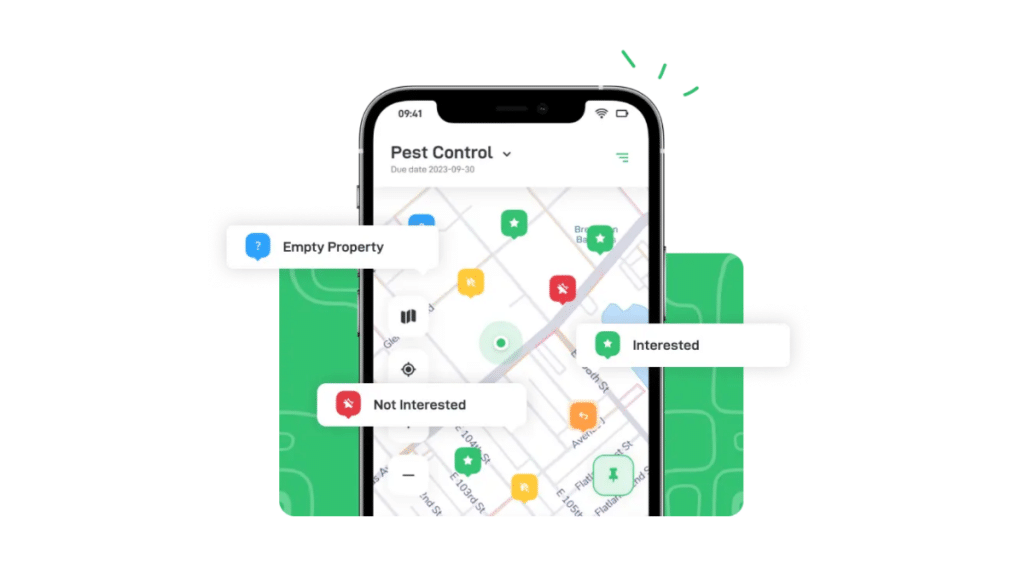With the rapid advancement of technology, traditional methods are being supplemented or even replaced by digital solutions. One such innovation is the door to door canvassing app, which offers a fresh approach to lead and sales conversions. But how does this app work, and what makes it an effective tool for businesses? Let’s dive into the details.
Understanding Door-to-Door Canvassing Apps
What is a Door-to-Door Canvassing App?
A door-to-door app is a mobile application with a web-based admin designed to streamline and enhance the process of direct sales and lead generation by allowing sales representatives to manage their routes, track interactions, and gather customer data seamlessly. These apps enable businesses to conduct face-to-face sales pitches while maintaining an organized and efficient workflow.
Key Features of Door-to-Door Apps
- Route Optimization: Helps sales reps plan their routes efficiently.
- Real-Time Tracking: Updates customer interactions, sales agent location, and lead status in real time.
- Customer Insights: Provides detailed information about leads and customers.
- Task Management: Allows scheduling and tracking of follow-up tasks.
The Lead Conversion Process
Definition of Leads and Customers
Leads are potential customers who have shown interest in a product or service, whereas customers are individuals who have made a purchase. Converting leads involves nurturing these prospects through various stages until they decide to buy.
Stages of the Lead Conversion Process
- Lead Generation: Identifying and attracting potential leads.
- Lead Qualification: Assessing the likelihood of a lead converting into a customer.
- Lead Nurturing: Engaging with leads through targeted communication and follow-ups.
- Conversion: Finalizing the sale and turning leads into customers.
Benefits of Using Door-to-Door Apps for Lead Conversion
Enhanced Customer Engagement
Door-to-door apps provide sales reps with tools to engage customers effectively. With real-time updates and detailed customer profiles, reps can tailor their pitches to individual needs, increasing the chances of conversion.
Real-Time Data Collection
These apps enable instant recording of customer interactions and feedback. This immediacy helps track progress and make timely adjustments to strategies.
Personalization and Targeted Marketing
By analyzing customer data, door-to-door apps allow for highly personalized marketing approaches. This tailored engagement helps in addressing specific customer pain points and preferences.
Improved Sales Team Efficiency
With route optimization and task management features, sales teams can operate more efficiently. This results in better time management and higher productivity.
How Door-to-Door Apps Work
App Functionalities
Door-to-door apps have features like GPS navigation, customer data management, and communication tools. These functionalities ensure that sales reps can perform their tasks more easily and precisely.
Integration with CRM Systems
Most door-to-door apps integrate with Customer Relationship Management (CRM) systems. This integration allows for a seamless flow of information between sales activities and customer databases, ensuring consistency and accuracy.
Tracking and Analytics
The apps provide robust analytics tools to monitor sales performance, customer interactions, and conversion rates. These insights are invaluable for refining sales strategies and improving results.
Challenges and Solutions
Privacy Concerns
Privacy is a significant issue when collecting and storing customer data. To address this, businesses must ensure compliance with data protection regulations and maintain transparent practices.
Technical Issues
Technical problems such as app glitches or connectivity issues can hinder performance. Regular updates and technical support are essential to mitigate these challenges.
Maintaining Customer Trust
Building and maintaining trust with customers is crucial. Sales reps should be trained to handle customer interactions professionally and respectfully, ensuring a positive experience.
Best Practices for Implementing a Door-to-Door App
Choosing the Right App for Your Business
Select an app that aligns with your specific needs and goals. Evaluate features, user reviews, and integration capabilities before making a decision.
Training Your Team
Ensure that your sales team is well-trained in using the app. Provide comprehensive training sessions and support to help them adapt to the new technology. You can also train to polish their sales pitch.
Setting Measurable Goals
Establish clear and measurable objectives for using the app. Track performance against these goals to assess effectiveness and make necessary adjustments.
Future Trends in D2D Apps
Innovations on the Horizon
The future of door-to-door sales apps looks promising with advancements in AI and machine learning. These technologies will enhance app functionalities and provide deeper insights into customer behavior.
Impact of AI and Machine Learning
AI can automate routine tasks, analyze customer data more effectively, and provide predictive analytics. This will further streamline the lead conversion process and improve overall efficiency.
Conclusion
Door-to-door apps are revolutionizing the way businesses approach lead conversion. By leveraging advanced features and real-time data, these apps offer a powerful tool for engaging with potential customers and turning them into loyal buyers. As technology continues to evolve, the capabilities of door-to-door apps will only enhance, providing even greater opportunities for businesses to succeed.
FAQs
- What are the main advantages of using a D2D app?
- It enhances customer engagement, provides real-time data, enables personalization, and improves sales team efficiency.
- How do door-to-door apps integrate with existing CRM systems?
- These apps can integrate with CRM systems to ensure seamless data flow and consistency between sales activities and customer information.
- Can D2D apps handle privacy concerns?
- Yes, with proper compliance with data protection regulations and transparent practices, privacy concerns can be effectively managed.
- What industries benefit most from door-to-door apps?
- Industries such as home services, retail, and field sales benefit greatly from door-to-door apps due to their direct sales nature and customer interaction needs.
- How can businesses measure the success of their apps?
- Success can be measured by tracking key metrics such as conversion rates, sales performance, customer feedback, and overall app usage.
